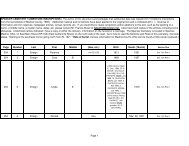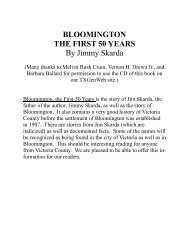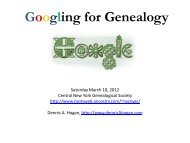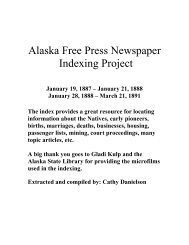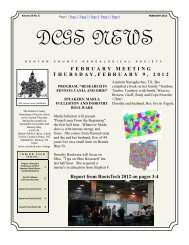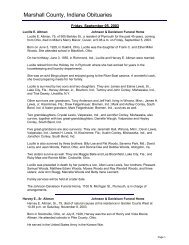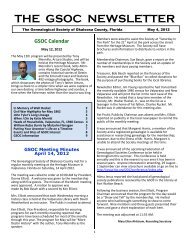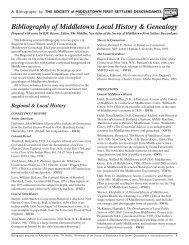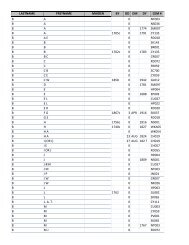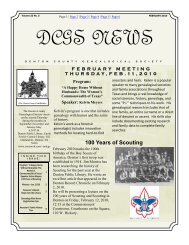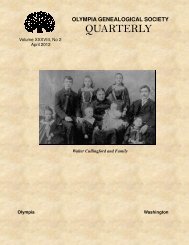Getting to the Roots of Your Family - RootsWeb - Ancestry.com
Getting to the Roots of Your Family - RootsWeb - Ancestry.com
Getting to the Roots of Your Family - RootsWeb - Ancestry.com
Create successful ePaper yourself
Turn your PDF publications into a flip-book with our unique Google optimized e-Paper software.
• http://www.gottschee.org/ - Gottscheer Heritage and Genealogy Association<br />
• http://wwwu.uni-klu.ac.at/hleustik/gottschee/ - Arbeitsgemeinschaft der Gottscheer<br />
Landsmannschaften<br />
• http://www.geocities.<strong>com</strong>/A<strong>the</strong>ns/9479/deu3.html - German minorities in former Yugoslavia;<br />
lists <strong>of</strong> <strong>to</strong>wn names, links <strong>to</strong> o<strong>the</strong>r web sites<br />
• http://www.maxpages.<strong>com</strong>/ourlostfamily/Yugoslavia - list <strong>of</strong> archive addresses<br />
• http://www.genealogienetz.de/reg/ESE/dsslawon.html - general resource page for Germans in<br />
Slavonia.<br />
CONGRESS POLAND<br />
This country was created at <strong>the</strong> Congress <strong>of</strong> Vienna in 1815 and referred <strong>to</strong> <strong>the</strong> Kingdom <strong>of</strong> Poland at<br />
that time. In 1831 <strong>the</strong> area was integrated in<strong>to</strong> <strong>the</strong> Russian Empire. In 1867 <strong>the</strong> name was changed <strong>to</strong><br />
Weichselland. U.S. records <strong>of</strong>ten refer <strong>to</strong> it as Russian Poland.<br />
Helpful web sites:<br />
• http://sggee.org/- resources include maps, village and parish lists with lists <strong>of</strong> available records<br />
[with FHL film numbers], record indexes<br />
• http://www.upstreamvistula.org/ Lots <strong>of</strong> his<strong>to</strong>rical material, pictures, maps, parish and cemetery<br />
information<br />
VOLHYNIA<br />
Germans began settling in Volhynia in <strong>the</strong> late 18th Century, but most actually arrived in <strong>the</strong> 1860s and<br />
later. Many came from Congress Poland or Western Galicia., where <strong>the</strong> available farm land had<br />
be<strong>com</strong>e <strong>to</strong>o crowded. By <strong>the</strong> early 1900s many Volhynian Germans emigrated back <strong>to</strong> Germany or <strong>to</strong><br />
North America.<br />
Helpful web sites:<br />
• http://www.odessa3.org/ - Odessa Digital Library<br />
• http://www.wolhynien.de/ - family his<strong>to</strong>ry in Volhynia, including an excellent research guide, FHL<br />
film numbers for German speaking Lu<strong>the</strong>ran parishes, and many o<strong>the</strong>r sources [mostly in<br />
German]<br />
• http://www.odessa3.org/collections/stpete/volhynia/ - links <strong>to</strong> indexed St. Petersburg Consis<strong>to</strong>ry<br />
Evangelical church records <strong>of</strong> Volhynia<br />
• http://www.mmhs.org/prussia/mmhsgen3.htm - Prussian Mennonite Genealogical Resources<br />
RUSSIA<br />
Germans were living in <strong>the</strong> Moscow area as early as <strong>the</strong> 15 th Century. O<strong>the</strong>r early areas <strong>of</strong> German<br />
settlement were Novgorod, Pskow, and Saint Petersburg. Most <strong>of</strong> <strong>the</strong>se early settlers were integrated<br />
in<strong>to</strong> Russian society.<br />
Ca<strong>the</strong>rine <strong>the</strong> Great first called for German settlers with <strong>the</strong> manifes<strong>to</strong>s <strong>of</strong> 1762 and 1766. Among <strong>the</strong><br />
first groups who followed her invitation were Mennonites from West Prussia, who, as pacifists, valued<br />
exemption from <strong>com</strong>pulsory military service.



